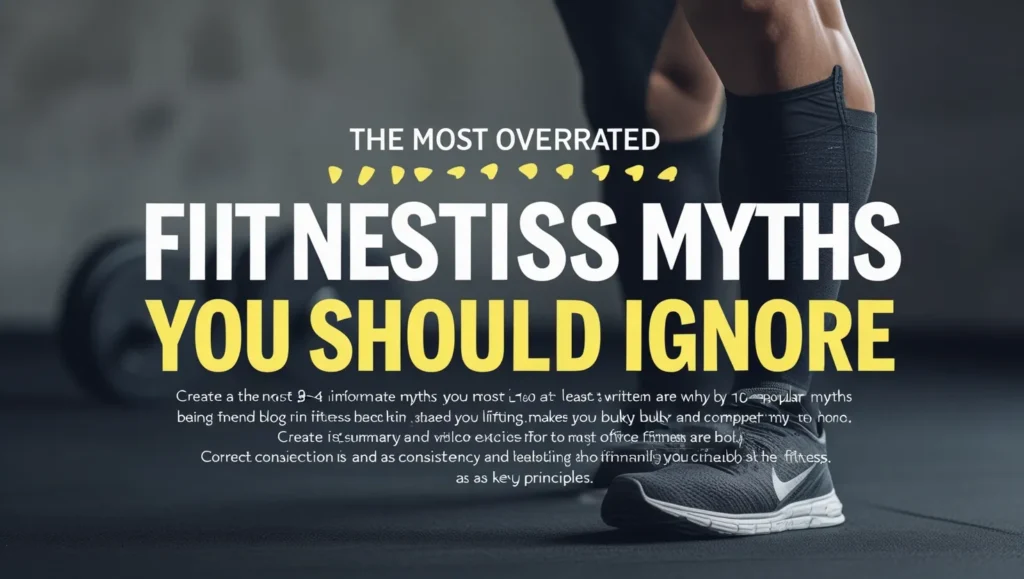The Most Overrated Fitness Myths
In the fast-paced world of fitness trends and social media influencers, misinformation spreads faster than a treadmill belt on high speed. Many well-meaning fitness enthusiasts unknowingly fall for myths that are not only unhelpful but can also hinder progress and lead to burnout or injury. If you’ve ever heard conflicting advice about how to lose fat, build muscle, or stay healthy, you’re not alone.
Let’s bust some of the most overrated fitness myths you should stop believing—starting today.
1. “No Pain, No Gain”
One of the oldest fitness clichés, “No pain, no gain” implies that unless you’re sore or pushing yourself to the edge, your workout isn’t effective. While it’s true that The Most Overrated Fitness Myths progress often involves stepping outside your comfort zone, pain should never be the goal.
Real progress comes from consistency, not suffering.
Muscle soreness (DOMS) is common after a new or intense workout, but chronic pain or sharp discomfort can indicate overtraining or injury. Rest and recovery are just as essential as your workouts—sometimes even more so.
2. “You Can Spot Reduce Fat”
Many people believe they can target fat loss in specific areas—like doing crunches to get rid of belly fat or leg lifts to trim the thighs. Unfortunately, spot reduction is a myth.
Fat loss happens across the entire body based on genetics, diet, and overall activity levels. You can tone muscles underneath a fatty area, but you can’t control where your body burns fat first.
Instead of isolating exercises, focus on full-body workouts, balanced nutrition, and cardio to reduce overall body fat.
3. “Carbs Are the Enemy”
Low-carb and keto diets have demonized carbohydrates, convincing many that eating carbs leads to weight gain. But the truth is, carbs are a vital source of energy, especially for active individuals.
Complex carbohydrates like whole grains, fruits, and vegetables provide essential fiber, vitamins, and fuel for your workouts.
It’s the processed, high-sugar carbs (like pastries and sugary drinks) that are the culprits—not whole, nutrient-dense carbohydrates. The key is moderation and balance.
4. “Lifting Weights Makes You Bulky”
This one mostly scares off women, but it’s time to set the record straight. Lifting weights does not automatically make you bulky—in fact, it’s quite the opposite.
Building significant muscle mass takes years of targeted training, strict nutrition, and often a genetic predisposition. For most people, strength training results in:
- A leaner, more toned physique
- Improved metabolism
- Better posture and joint health
So, don’t be afraid to pick up the dumbbells—you’ll thank yourself later.
5. “Sweating Means You’re Burning More Fat”
Sweat is your body’s natural cooling system, not an indicator of how many calories The Most Overrated Fitness Myths you’ve burned or fat you’ve lost. Factors like temperature, humidity, genetics, and hydration levels all affect how much you sweat.
A high-sweat workout doesn’t necessarily mean it’s more effective.
Instead of judging your progress by your shirt’s dampness, focus on long-term goals, performance improvements, and how your body feels and functions.
6. “More Time in the Gym = Better Results”
Spending hours at the gym might look impressive, but quality beats quantity every time. Overtraining can lead to fatigue, injury, and even hormone imbalances.
Most people see great results with 45–60 minutes of focused training, 4–5 days a week. Effective workouts include:
- Compound movements (like squats and deadlifts)
- High-intensity interval training (HIIT)
- Adequate rest periods
Remember: progress happens in the rest and recovery phase, not during the grind.
7. “You Have to Be Perfect With Your Diet”
Fitness culture often promotes extreme dieting—cutting out all treats, counting every calorie, and obsessing over every meal. But long-term success is built on sustainability, not perfection.
One cheat meal won’t ruin your progress, just like one salad won’t fix a poor diet.
Allowing yourself flexibility helps you stay consistent over time. Build a diet around whole foods, stay hydrated, and enjoy indulgences in moderation.
8. “You Need Supplements to See Results”
Walk into any gym or scroll through fitness influencers’ pages, and you’ll be bombarded with protein powders, fat burners, and pre-workouts. But here’s the truth: supplements are just that—supplementary.
You don’t need them to make progress if your diet and training are on point. In fact, many people see great results without using any supplements at all.
If you choose to use them, stick to well-researched options like:
- Protein powder (for convenience)
- Creatine monohydrate
- Basic multivitamins (if needed)
Skip the hype and focus on real food and consistent training.
9. “You Need to Be Fit to Start Working Out”
This myth is particularly harmful because it keeps people from starting. The idea that you have to lose weight or “get in shape” before joining a gym or starting a routine is The Most Overrated Fitness Myths completely backward.
Everyone starts somewhere, and fitness is a personal journey—not a competition.
Whether you’re 20 or 60, beginner or advanced, what matters is taking that first step. Progress comes with time, effort, and patience.
Final Thoughts
The fitness world is filled with myths, trends, and flashy advice that can confuse even the most dedicated individuals. But when you strip away the noise, The Most Overrated Fitness Myths the basics still hold true:
- Move your body regularly
- Eat nourishing food
- Rest and recover
- Stay consistent
Ignore the hype, trust the process, and remember that fitness is a lifelong journey—not a quick fix. Listen to your body, educate yourself, and don’t let these overrated myths keep you from becoming the healthiest version of you.


